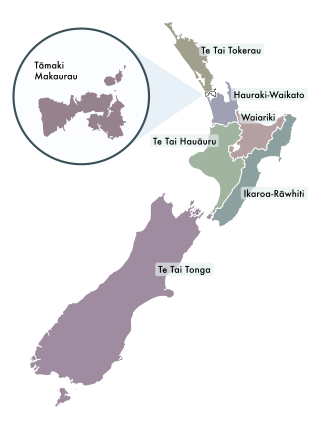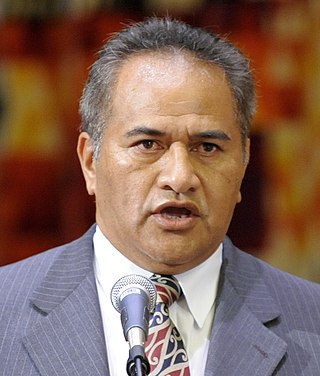Related Research Articles

Tainui is a tribal waka confederation of New Zealand Māori iwi. The Tainui confederation comprises four principal related Māori iwi of the central North Island of New Zealand: Hauraki, Ngāti Maniapoto, Ngāti Raukawa and Waikato. There are other Tainui iwi whose tribal areas lay outside the traditional Tainui boundaries – Ngāi Tai in the Auckland area, Ngāti Raukawa ki Te Tonga and Ngāti Toa in the Horowhenua, Kāpiti region, and Ngāti Rārua and Ngāti Koata in the northern South Island.

KīngiTāwhiao, known initially as Matutaera, reigned as the Māori King from 1860 until his death. After his flight to the King Country, Tāwhiao was also Paramount Chief of the Rohe Pōtae for 17 years, until 1881. A Waikato Tainui nobleman, rangatira, and religious figure, Tāwhiao amassed power and authority during a time of momentous change, to become de facto leader of the Waikato tribes. He was a member of the Ngati Mahuta hapū, who comprise the kāhui ariki.

In New Zealand politics, Māori electorates, colloquially known as the Māori seats, are a special category of electorate that give reserved positions to representatives of Māori in the New Zealand Parliament. Every area in New Zealand is covered by both a general and a Māori electorate; as of 2020, there are seven Māori electorates. Since 1967, candidates in Māori electorates have not needed to be Māori themselves, but to register as a voter in the Māori electorates people need to declare that they are of Māori descent.

Tukoroirangi "Tuku" Morgan is a New Zealand Māori politician and former broadcaster.

Koro Tainui Wētere was a New Zealand politician. He was an MP from 1969 to 1996, representing the Labour Party. He served as Minister of Māori Affairs in the Fourth Labour Government (1984–1990).

The Māori King Movement, called the Kīngitanga in Māori, is a Māori movement that arose among some of the Māori iwi (tribes) of New Zealand in the central North Island in the 1850s, to establish a role similar in status to that of the monarch of the British colonists, as a way of halting the alienation of Māori land. The Māori monarch operates in a non-constitutional capacity without explicit legal or judicial power within the New Zealand government, but significant soft power and national influence. Reigning monarchs retain the position of paramount chief of several iwi, and wield some power over these, especially within Tainui. The influence of the Māori monarch is widespread in Māoridom despite the movement not being adhered to by several major iwi, notably Tuhoe, Ngāti Porou, and the largest of all, Ngāpuhi.

An electorate or electoral district is a geographic constituency used for electing a member (MP) to the New Zealand Parliament. The size of electorates is determined such that all electorates have approximately the same population.

Tāmaki Makaurau is a New Zealand parliamentary Māori electorate returning one Member of Parliament to the New Zealand House of Representatives. It was first formed for the 2002 election. The electorate covers central and southern Auckland, and southern parts of western Auckland. It derives its name from the Māori-language name for Auckland; Makaurau is a descriptive epithet referring to the value and desirability of the land.

Te Tai Hauāuru is a New Zealand parliamentary Māori electorate, returning one Member of Parliament to the New Zealand House of Representatives, that was first formed for the 1996 election. The electorate was represented by Tariana Turia from 2002 to 2014, first for the Labour Party and then for the Māori Party. Turia retired and was succeeded in 2014 by Labour's Adrian Rurawhe who retained the seat in 2017 and again in 2020.

Hauraki-Waikato is a New Zealand parliamentary Māori electorate first established for the 2008 election. It largely replaced the Tainui electorate. Nanaia Mahuta of the Labour Party, formerly the MP for Tainui, became MP for Hauraki-Waikato in the 2008 general election and was re-elected in 2011, 2014, 2017 and 2020.
Western Maori was one of New Zealand's four original parliamentary Māori electorates established in 1868, along with Northern Maori, Eastern Maori and Southern Maori. In 1996, with the introduction of MMP, the Maori electorates were updated, and Western Maori was replaced with the Te Tai Hauāuru and Te Puku O Te Whenua electorates.

Ihaia Tainui was a Māori member of the New Zealand parliament.

Hōri Kerei Taiaroa, also known as Huriwhenua, was a Māori member of the New Zealand parliament and the paramount chief of the southern iwi of Ngāi Tahu. The son of Ngāi Tahu leader Te Mātenga Taiaroa and Mawera Taiaroa, he was born at Ōtākou on the Otago Peninsula in the 1830s or early 1840s.
Weretā Tainui Pītama was a New Zealand farmer, land claimant and trust board chairman of Māori descent, affiliated with the Ngāi Tahu iwi. He was born in 1881 at Te Rāpaki-o-Te Rakiwhakaputa.
Te Mātenga Taiaroa was a leader of Ngāi Tahu, a Māori iwi (tribe) of the South Island of New Zealand. Taiaroa belonged to Ngāi Te Ruahikihiki and Ngāti Moki hapū of Ngāi Tahu, which were centred on Taumutu, at the southern end of Lake Ellesmere / Te Waihora. From the 1830s to the 1860s, he was a leader at Ōtākou on the Otago Peninsula in association with his cousin Karetai. In the 1830s, he fought against Te Rauparaha and Ngāti Toa, sometimes in conjunction with Tūhawaiki. He was later involved in peacemaking with Ngāti Toa. In 1856 he attended the meeting of Māori chiefs at Pūkawa, Lake Taupō, which elected Pōtatau Te Wherowhero as the first Māori King. In 1860 he attended the Kohimarama conference of Māori chiefs in Auckland, organised by the government. In 1859 Taiaroa was baptised by a Methodist minister and took the Christian name of Te Mātenga (Marsden). Hōri Kerei Taiaroa was one of his children.

Pei Te Hurinui Jones was a Māori political leader, writer, genealogist, and historian. As a leader of the Tainui tribal confederation and of the Māori King Movement, he participated in negotiations with the New Zealand Government, seeking compensation for land seizures, served on several boards, and authored a number of works in Māori and English, including the first history of the Tainui people.

Hamilton City Council is the territorial authority for the New Zealand city of Hamilton.
Hauraki was a New Zealand parliamentary Māori electorate returning one Member of Parliament to the New Zealand House of Representatives. It existed for one parliamentary term from 1999 to 2002, and was held by John Tamihere. The electorate's area was formed from the northern portion of Te Tai Rawhiti as well as a small portion of Te Tai Hauāuru. Its area was expanded significantly westward to form the Tainui electorate for the 2002 election.
The 1885 Southern Maori by-election was a by-election held on 10 June 1885 in the Southern Maori electorate during the 9th New Zealand Parliament.
The 1879 Southern Maori by-election was a by-election held on 7 July 1879 in the Southern Maori electorate during the 6th New Zealand Parliament.
References
- ↑ "Taiaroa Elected". West Coast Times. 3 March 1881.
- ↑ "Taiaroa Elected". Timaru Herald. 4 March 1881.